Return to Brattleboro: Literary Fest 2024
D.E. Bentley
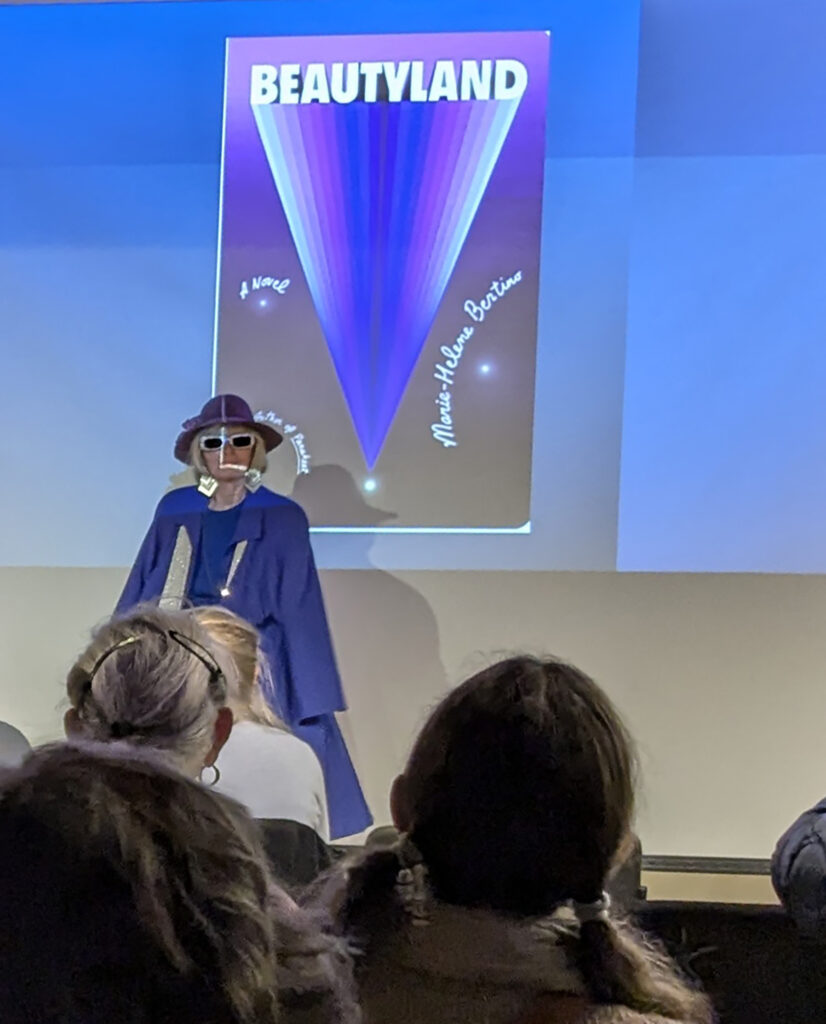
I’d lost track of how many years it had been since I, by chance, found myself in downtown Brattleboro during their annual literary festival. Looking back, I tried to recall something, a vague déjà vu of names and faces. Or the lingering aura of a title I’d picked up and read. As I entered 118 Elliot Street for the start of the 2024 festival, settling into a chair in the rear, I did recall the sense of community I had felt, back then. Reason enough to return, I mused, moments before a star-studded promenade of live models wearing book cover-inspired outfits (thrifted classy attire and accessories from Experienced Goods and Morning Glorious Vintage) kicked off the 2024 event. Cries of delight and recognition erupted from the audience as each Books to Looks Fashion Show model appeared in front of catchy corresponding book covers flashed on the screen. A display of fashion seemed fitting given that book covers are what first catch our eye, entice us to dive into the words, drown in the wonder within.

The Brattleboro Literary Festival runs for three days each fall and features recently published authors presenting at multiple venues. All of the venues are within walking distance of one another, which offers sightseeing opportunities, and exercise. Catching all the authors is impossible, but given that my traveling companion and I live in the Finger Lakes Region of New York State, a six-hour drive, our goal was to fit in as much as we could. The authors are paired for the various themed sittings, with talks and readings followed by a conversational Q&A. I love this format and enjoy the post-reading exchanges as further exploration of how other writers think and work, mining their words and worlds for inspiration.
It occurred to me as I began writing this piece that it is impossible to progress as I might with a traditional review. I have not experienced most of the books as a reader (or gained an adequate understanding of the authors or, in some cases, the subjects or genres) to discuss the titles. I offer, instead, a review of structure and setting. A sense of place as I experienced it in the hopes that others might be drawn to the magic and join in.
A good literary festival offers nibbles of information that tantalize and intrigue, transporting attendees to places both familiar and unknown. The Brattleboro literary Festival 2024, which was held October 18-20, offered an abundance of “destinations,” from everyday lives to exotic adventures—past, present, and future. Poetry delved into the fallen empire of Rome, the Razzle Dazzle of Major Jackson, the natural world, and contemporary urban culture. “Cuban Influences” explored space and time, power and place through the visions of Vermont residents Pablo Medina (Sea of Broken Mirrors) and Leslie Sainz (Have you been Long Enough at Table).
Non-fiction presentations touched on classical writers’ influences on the “Pursuit of Happiness,” our continuing struggles for equality, migration and refugee experiences, environment, and contemporary themes (body image, addictions). Authors writing about their famous parents included tributes to Hollywood couple Paul Newman and Joanne Woodward (by their daughter Melissa Newman) and to Frank Zappa (by Moon Unit Zappa).
Fiction titles delved deep into social constructs, survival, loyalty and belonging, planetary encounters, mystical creatures, love and solitude, mystery and intrigue. Since presentations overlapped (with no set scheduled time for meals), fiction was default genre. Synergy between paired authors drew me into some of the presentations. Other times it was or the sub-genre that inspired my stop in at one venue, or another. My current interests, beyond reading and writing (carving, puppetry, natural history, and visual arts), were, I realized, also relevant. In some cases, it was something from my childhood that compelled me to pick up a particular title. And, yes, the catchy covers played a role!
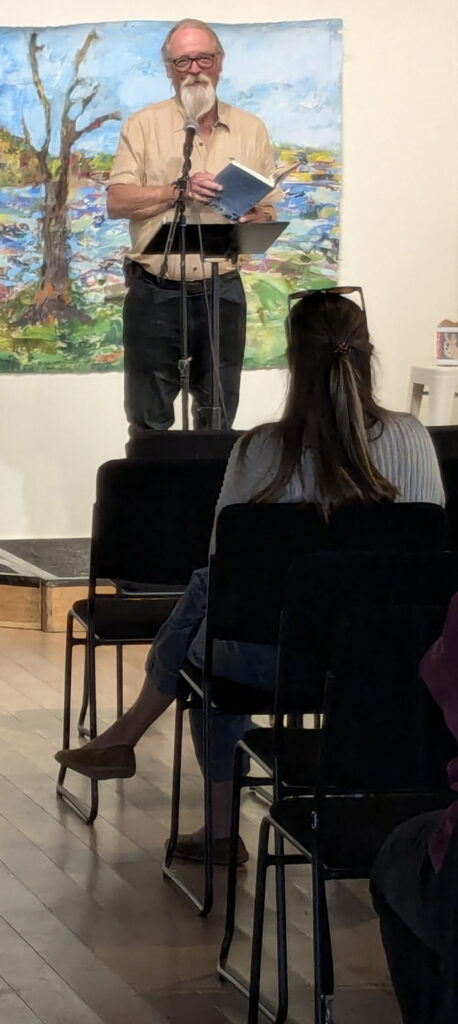
I exuberantly ventured from venue to venue in search of the next great read or a nugget of kicked up gem to spark my imagination and feed my own writing (one of the goals of this journey for myself and a writing group friend who I traveled with). Notable among these was Beep, by Bill Roorbach, which caught my attention as much for the plays on language and sociological insights (Roorbach creates a vocabulary and interpretations on human nature for Beep, a squirrel monkey from the Costa Rican rain forest who gets smuggled into Manhattan by a tween) as for the underlying environmental themes. Like Beep, Roorbach is both bold and funny. His discussion of audio book voice development for his myriad of animal and human characters was interesting and entertaining. Roorbach was paired with Mark Cecil whose debut novel (Bunyan and Henry: Or, the Beautiful Destiny) is a reinvention of American folklore. As a children’s book author and illustrator, I was interested was Cecil’s beta readers discussion. He tried out the story on his own children during bedtime story times, and applied their critiques to future drafts.
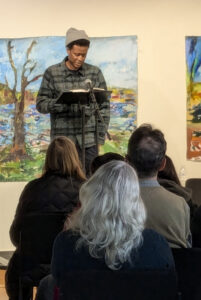
We often gravitate toward what is familiar, known, even at the risk of creating experiential silos. Listening to the authors of My Beloved Life and We Are a Haunting (“Family History, and Myth” with Amitava Kumar and Tyriek Rashawn White) offered insights into cultural experiences outside of my own. Kumar’s story extends beyond his main characters, an Indian man and his daughter, to explore historical transformations, generational changes, and the inherent connections between life and literature. Tyriek White also touches on transformation, across three generations of a working class family in Brooklyn. Described as a “searing social critique and potent account of displaced lives,” White’s story includes supernatural ghosts. I look forward to exploring how he uses this ghost legacy to tell the story and how it relates to the family “ghosts” that we all have, regardless of our social and cultural roots.
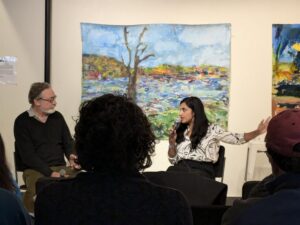
My current (ever evolving and expanding) interests include wood carving, so I was drawn like a moth to a flame by the description of Tania James’s book Loot: ”the dazzling and wildly inventive story of an Indian woodcarver’s quest to retrieve a spectacular wooden tiger from an English country estate.” I have been carving wooden puppets recently and the mention of carving was adequate to hold me there—even before I found out that the tiger was an automaton! Despite being lured initially by the mention of carving, I also enjoyed M.T. Anderson’s discussion of Nicked, a novel that takes place in the 11th Century and features a young Benedictine Monk who travels to Turkey with a cast of seafaring characters to retrieve the bones of Saint Nicholas. The story was intriguing and the audience was pulled back in time by the author’s macabre and marvelous talk. More books added to the stack!
This presentation reminded me, yet again, of why I love this particular festival so much. After the readings I talked with Tania James a bit, about my interest in carving and her research into carving—which yielded a very relatable passage in her reading. After listening to morning presentations, we encountered her at The Works Café (wonderful lunch, BTW!), and, again, on the sidewalk as we moved between venues. Brattleboro is a town of 12,000 and its small size and the various reading venues allows for these chance encounters, generous conversation between attendees, and a sense of community, even among strangers.
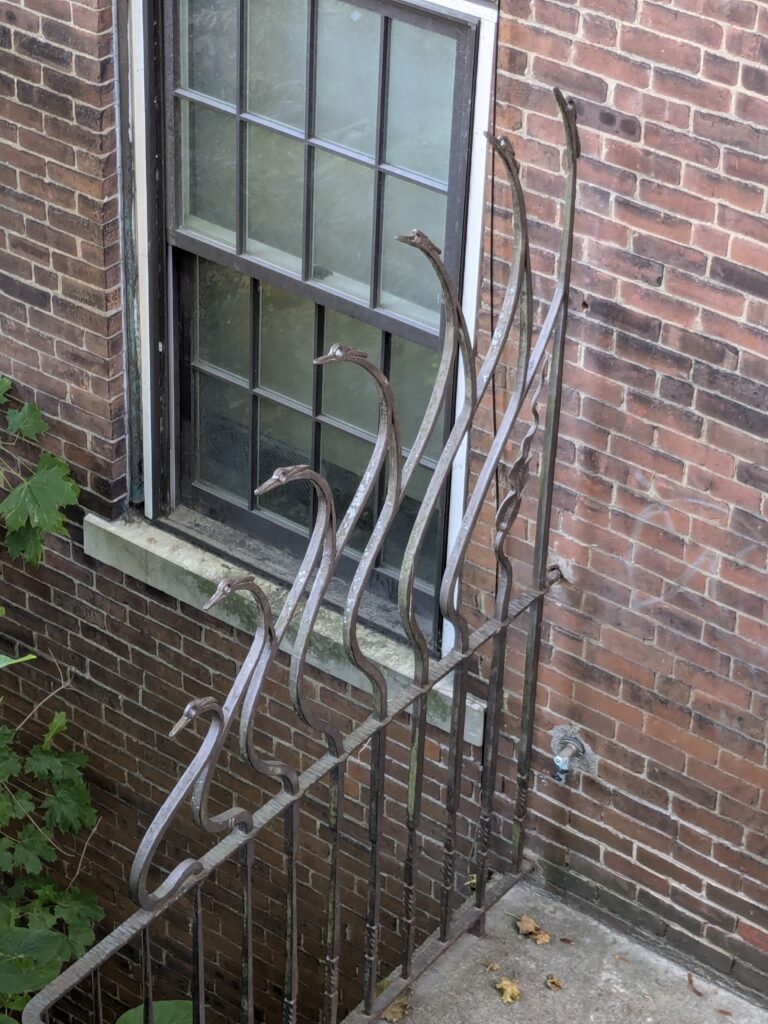
Art is also an integral part of the Brattleboro community and as one moves through town there is something beautiful at every turn. The hillside and Connecticut River to the east transition to welcoming streets featuring an abundance of Victorian era buildings interspersed with wall art and welcoming signs for retail businesses and eateries. The magic is there in the little things often missed. While walking Main Street, I ventured down a walkway toward the river and discovered a delightful geese-themed wrought iron railing. I was mesmerized by this simple elegant design and spent some lovely time visiting with a couple who joined me in this inviting space, this moment in time.
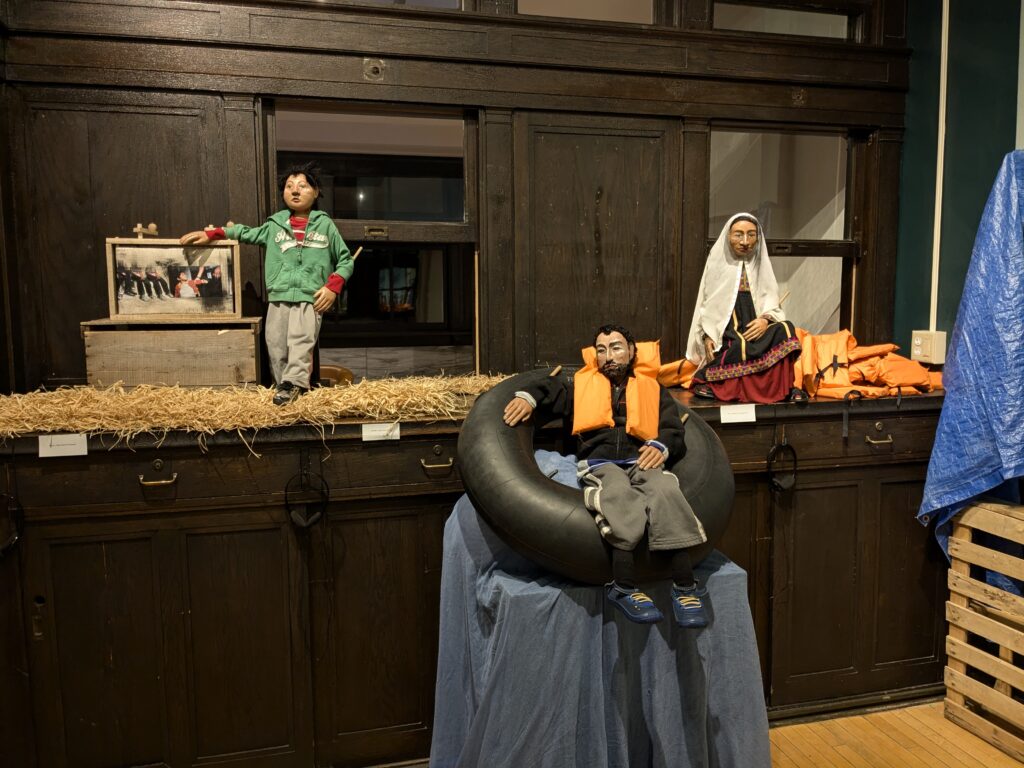
Continuing south along Main Street toward Canal Street takes readers to the Brattleboro Museum and Art Center, which hosted a presentation by Natalie Dykstra about her book, Chasing Beauty: The life of Isabella Stewart Gardner, that explores through objects of art Gardner’s life and the legacy she left behind in the Boston museum that bears her name. There were also some inspiring exhibitions on view. Saks Afridi’s SpaceMosque exhibition was captivating and surreal; I could have spent days just poring over the details and descriptions. The puppetry exhibit featuring Vermont’s Sandglass Theatre was a delightful and unexpected treat. I seek out puppetry when I travel and was thrilled to be able to see some of the puppets and sets from two of their shows: All Weather Ballads (2010) features Vermont’s “local landscape and lore” through the changing seasons and Babylon (2016) which explores migration and refugees and asks the question, “what is home?”
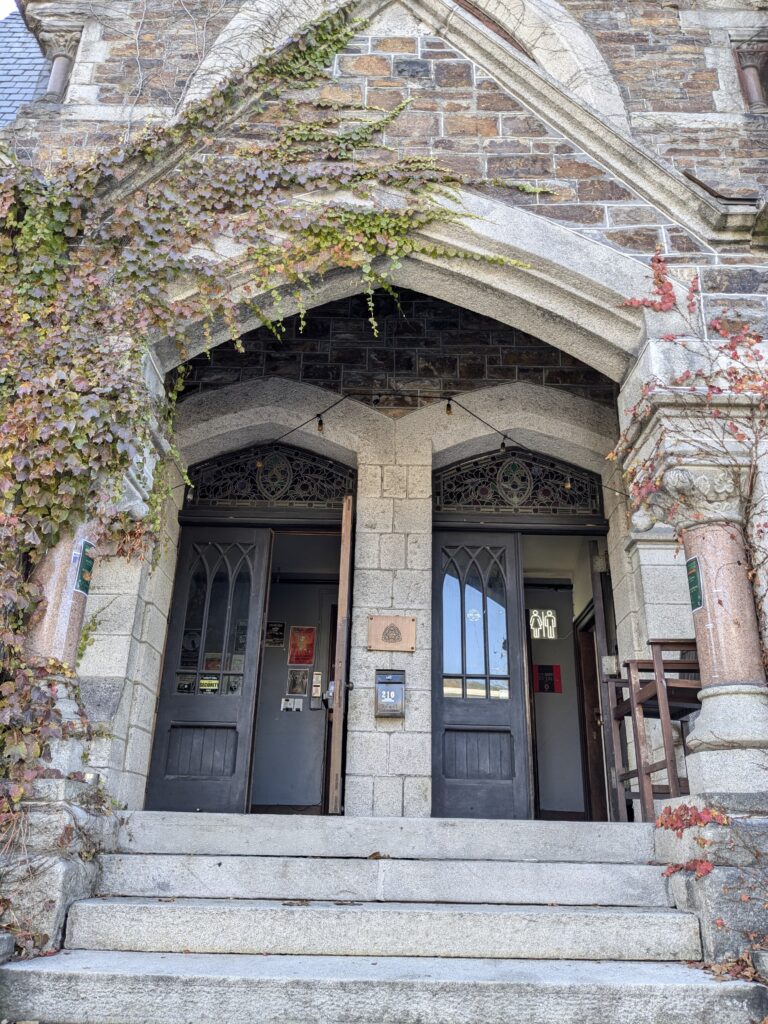
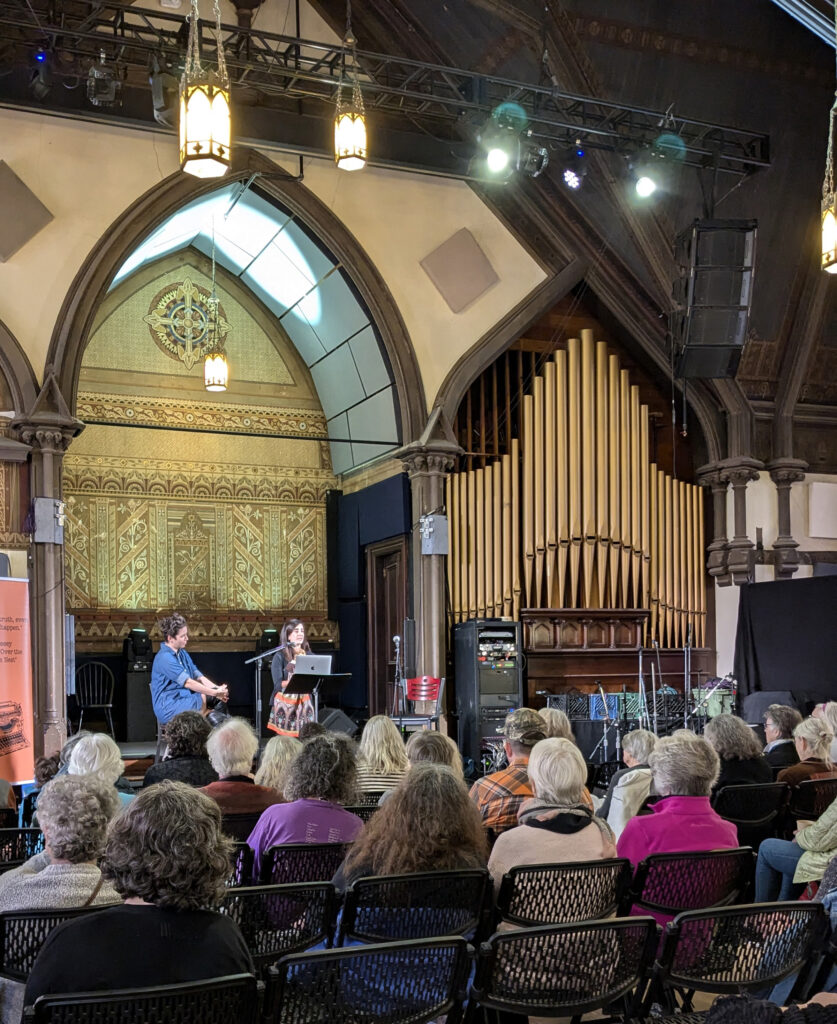
Another beautiful and inviting venue for the literary festival, one of my favorites, is The Stone Church. The Stone Church is a bar and music venue located in a renovated former Victorian Gothic church. It was there that I listened to Brad Fox discussing The Bathysphere Book: Effects of the Luminous Ocean Depths. His talk included a series of slides that added interest and helped to illuminate the experience of these early deep-sea explorers—and the illustrators who turned words into images, offering the earliest glimpses into this previously unknown realm. I also enjoyed wonderful readings about two speculative fiction titles at The Stone Church: Beauty Land by Marie-Helene Bertino (about a woman who communicates with a faraway planet, using a fax machine to convey her written observations of humanity) and Bear by Julia Phillips (two sisters have different reactions when a bear appears near their Pacific Northwest island home). There is a mystery that seeps into the stones of places like Stone Church, which made it the perfect setting for these presentations, and the delightful author and audience exchanges that followed.
The magic during our weekend in Vermont seemed to multiply and morph: like clouds as they are pushed along; or migrating geese in their endlessly shifting patterns through a blue-sky canvas. Minor connections that seemed, in those moments, less random than chance might allow: an engaging encounter on a bridge; musicians busking on a street corner; conversation with a fellow author or artist. It was a magic that began with our drive in, which was simply beautiful and included heart-warming conversation and a mandatory stop at one of my favorite bookstores, Lyrical Ballad in Saratoga Springs (yes, I bought books). The gifts of the changing seasons were painted across the horizons that moved past. The landscape between my home and Brattleboro offers views around every turn, interspersed with small towns with historical buildings built at a time when small decorative details offer eye candy for anyone who likes to look at architectural details (as I do). Our Brattleboro lodging, an Airbnb apartment in a 100-year-old home minutes from downtown, offered historic charm with stained glass panels, decorative period radiators, and walls adorned with original artwork.
Time is an allusive construct, although zeroing in on how long it had been since my first visit to the Brattleboro Festival proved easier than anticipated. The Stone Church had opened the year before; my son and I had discovered the venue as we walked along Main Street. Our arms were, at the first sighting, full of freshly-harvested apples, tossed to us moments before from a heaping truck bed by pickers perched atop their bounty. As Zachary behind the bar, mixed me up a Paradise Found in advance of a reading this year, I asked when they opened … and there was my answer: it had been six years since my first festival visit.
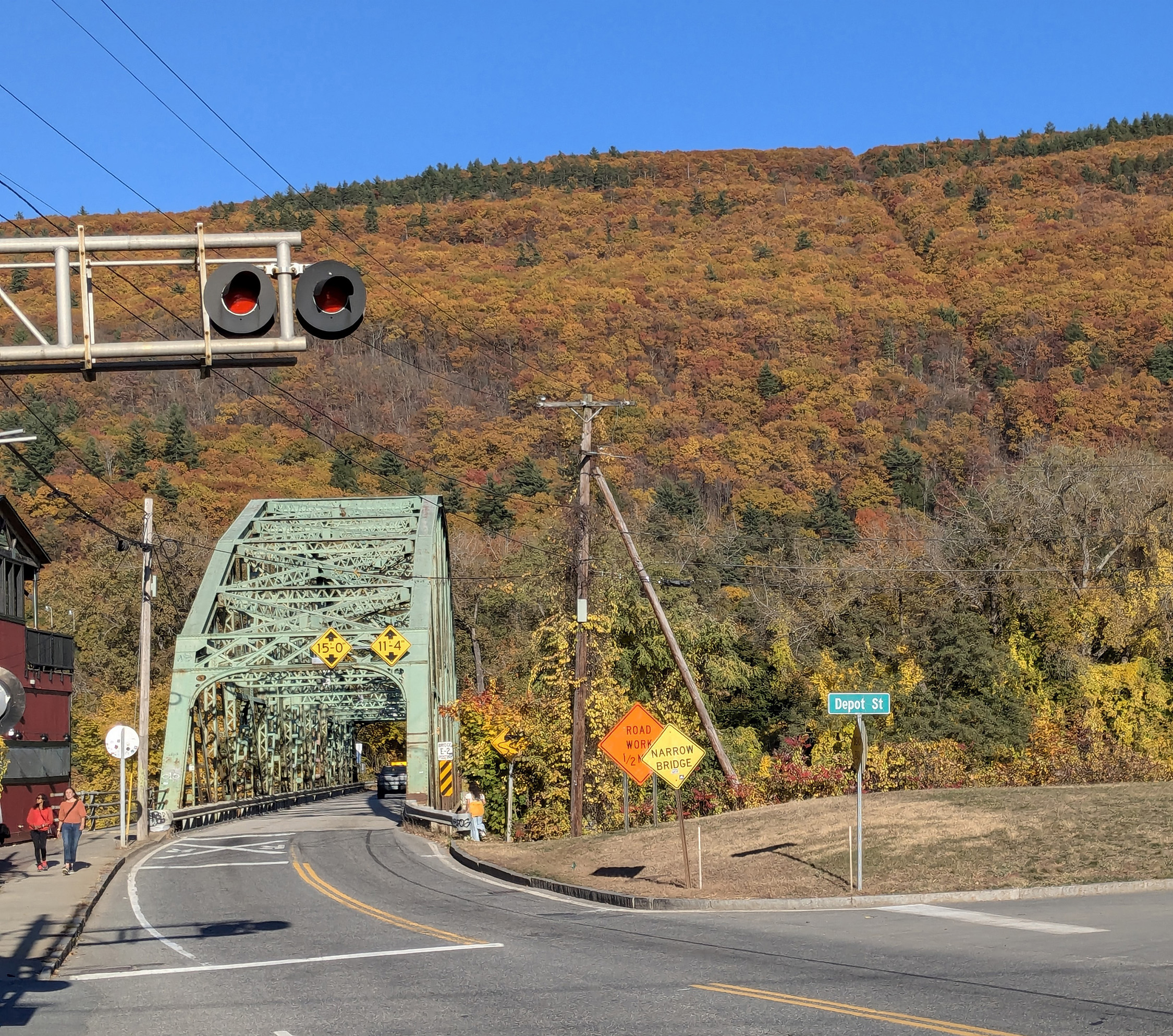
Like the multi-colored fall foliage that blanketed the hillsides of this small Vermont town, the myriad of authors and stories offered a mesmerizing mosaic of genres and styles to nourish and inspire writers and readers. Despite the plethora of digital divide that dominates our lives—informational static steadily seeking to erode the connections that facilitated and remain crucial to our very survival as a species—books, real books, continue to push their way into the mix to inform and enlighten. Events like the Brattleboro Literary Festival have survived and, in some cases, thrived.
I am drawn by the warmth or written words and find comfort in stories well told. Back home, I look forward to my next visit to Brattleboro. In the meantime, I now have new memories and connections to cherish—and a considerable stack of new titles to read—as the colder months to come chase the remaining leaves from the trees and the wood stove offers warmth for leisurely reads.